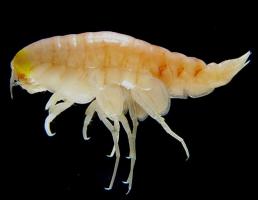
Photo: Dr. Alan Jamieson
There appears to be no limit to the man-made pollution of the oceans. Toxic chemicals have now been found in the deepest portions of the ocean, at the bottom of the Marianas and Kermadec trenches. Each trench is over 10 kilometers deep and 7,000 kilometers apart in the Pacific Ocean. A study based on expeditions led by Newcastle University’s Dr Alan Jamieson found high levels of polychlorinated biphenyls (PCBs) and polybrominated diphenyl ethers (PBDEs) in the fatty tissues of amphipods, a crustacean, in the trenches. PDBs and PBDEs were banned in the 1970s after they were determined to be carcinogenic. These chemicals are classed as Persistent Organic Pollutants – or POPs, because they are highly resistant to natural degradation and can persist in the environment for decades.
In a press release, Dr Jamieson, said, “We still think of the deep ocean as being this remote and pristine realm, safe from human impact, but our research shows that, sadly, this could not be further from the truth. In fact, the amphipods we sampled contained levels of contamination similar to that found in Suruga Bay, one of the most polluted industrial zones of the northwest Pacific. What we don’t yet know is what this means for the wider ecosystem and understanding that will be the next major challenge.”
The research suggest that that the POPs settled in the deepest parts of the oceans as dead animals and particles of plastic fall downwards. POPs accumulate in fat and are therefore concentrated in creatures up the food chain. They are also water-repellent and so stick to plastic waste.
“The very bottom of the deep trenches like the Mariana are inhabited by incredibly efficient scavenging animals, like the 2cm-long amphipods we sampled, so any little bit of organic material that falls down, these guys turn up in huge numbers and devour it,” said Dr. Jamieson.
‘Extraordinary’ levels of pollutants found in deepest parts of sea
Thanks to Irwin Bryan and David Rye for contributing to this post.
